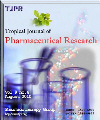
|
Tropical Journal of Pharmaceutical Research
Pharmacotherapy Group, Faculty of Pharmacy, University of Benin, Benin City, Nigeria
ISSN: 1596-5996
EISSN: 1596-5996
Vol. 8, No. 5, 2009, pp. 441-447
|
 Bioline Code: pr09057
Bioline Code: pr09057
Full paper language: English
Document type: Research Article
Document available free of charge
|
|
|
Tropical Journal of Pharmaceutical Research, Vol. 8, No. 5, 2009, pp. 441-447
| en |
Microbiological Assessment of Commercially Available Quinine Syrup and Water for Injections in Dar Es Salaam, Tanzania
Mwambete, Kennedy D.; Justin-Temu, Mary & Fazleabbas, Fatema S.
Abstract
Purpose:
To conduct microbiological assessment of commercially available quinine syrups and water for
injection in Dar es Salaam, Tanzania.
Methods:
This was a cross-sectional study conducted in Dar es Salaam Region. Samples of quinine
syrups (QNSs) and water for injection (WFI) of different batches were randomly purchased. Each QNS
was inspected for label disclosure, and physicochemical properties were examined by the use of sense
of organs and pH meter. Isolation and quantification of microbial contaminants from each sample was
preceded by 24 - 48 h incubation at 37 ºC, and the microbial contaminants were expressed as colony
forming unit per millilitre (cfu/ml). Microbiological identification of contaminants was performed by
examination of colony morphologies and growth characteristics. Gram staining technique, as well as
biochemical and serological tests were also conducted for further identification. Albino rabbits were used
for the pyrogen test to determine the presence of microbial contamination in WFI.
Results:
Twenty-four samples of QNS underwent label disclosure, physical-chemical and
microbiological assessments. All QNS samples complied with the guidelines and microbial limits as per
United States Pharmacopoeia (USP). All batches of WFI were found to be microbiologically
contaminated, revealing average microbial counts of 87, 94 and 100 cfu/ml, and this was buttressed by
pyrogen test, with the animals showing temperature rise of 1.0, 2.2 and 2.4 ºC, respectively.
Conclusion:
The QNS products available in the Dar es Salaam market were of good microbial quality.
However, WFI products were microbiologically contaminated. We recommend that regulatory authorities
in Tanzania should diligently enforce regulatory control of the products to assure consumer safety.
Keywords
Microbiological quality, quinine syrups, water for injection, pyrogen test
|
| |
© Copyright © Pharmacotherapy Group, Faculty of Pharmacy, University of Benin, Benin City, 300001 Nigeria.
Alternative site location: http://www.tjpr.org
|
|
